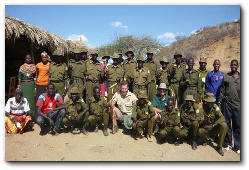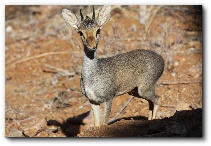News & Updates
NAIROBI (Kenya), Newsletter February, 2011
Dear readers,
Anti poaching does not only consists of preventing animals ending up in
snares; it means also caring about their environment. Deforesting is a major
problem in Africa and has ALL4AP’s serious attention. Trees hold water and
provide the animals of water, shelter and food.
With this in mind, on our first day off we went to the Arboretum in Nairobi
where you can find lots of indigenous and exotic trees. We have talked tot
the Manager of Education in charge who explained us more about the
Arboretum and after telling her of our activities and interest, she invited us
for a lecture on deforesting on February 24th, given by the I.U.C.N. (The
World Conservation Union, www.IUCN.org).
Deforesting is a huge problem in Kenya, caused by the explosive growth of
the Kenyan people and the intensively use of firewood (cooking). In the past
25 years the population of Kenya has been doubled to 40 million habitants
and will, according to calculations of the UN rise towards 85 million people in
the next 40 years which means a grow of 3000 people per day. (Bron:
Journal ‘The East African’ Febr. 14-20, 2011)
With the current unemployment percentage of 65, a lot of people try to make
a job out of making charcoal which increases the problem of deforestation.
On a small scale, projects are busy planting trees. At the end of the lecture,
the request of the I.U.C.N. to all people which were attending was to plant at
least 1 tree and be sure that it will grow and stays alive.
At the end of the day, we visited Solar Cooking, a small organisation which
provides in alternative ways for cooking by using the heat of the sun, instead
of firewood, gas or Electricity. Officially the office was closed but one of the
people involved was willing to show us the different types for solar cooking.
Today we went back to buy one of the models to experience ourselves if and
how this works. In our next newsletter we will share our experiences with
this.
As mentioned in our previous newsletter, we went together with dr. Davidson
to the Milgis area in the Samburu province, in the middle-east part of Kenya.
We were asked to train the 25 scouts which are operating in this area, in
optimizing the use of their GPS. The majority of the scouts do not speak
English, so the manager did all the translations. The scouts were very
enthusiastic and eager to learn and it was great to work with them. With the
data they assemble during their patrolling, the area can be mapped which
will give a better understanding of the area.
At the same time, it was for us a unique opportunity to explore and learn
more of the Kenyan landscape and meet and learn to know more people. For
instance Helen and Pete from the Milgis Trust. Great people who, for many
years, have devoted their lives to the Milgis (River) area, its wildlife and
habitants (www.milgistrustkenya.com).
And also Richard of the Grevys Zebra Trust (www.grevyszebratrust.org). An
organisation which is dedicated to preserve this endangered species.
Yesterday, March 07th, we have returned from this trip and back home, we
are checking our e-mails because there was hardly any internet- and or
telephone reception in the area mentioned. We also called the intermediate
for our registration as an NGO and learned that they are still busy with the
judging. Martin has made an appointment to see them tomorrow.
Dik dik, a mini antilope which we saw a lot in the Milgis.
Our team in Zimbabwe has removed 5 snares in the past 4 weeks. The
amount of snares is relatively low which has mainly 2 reasons; this period is
the rainy season in which all people are busy with agriculture and
unfortunately we still have no permission to patrol in the areas where it is
mostly needed.
Best regards,
The ALL4AP team.












